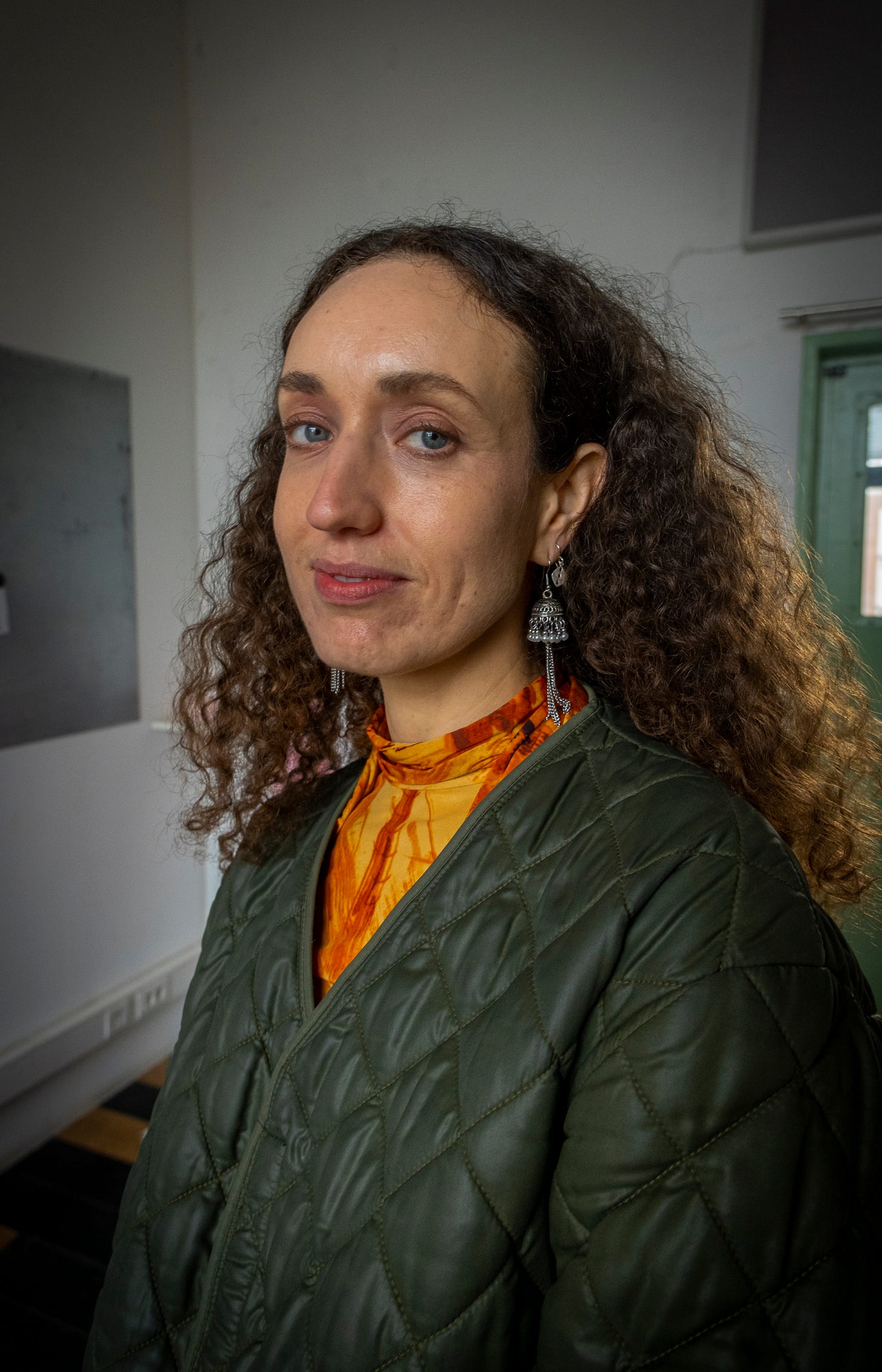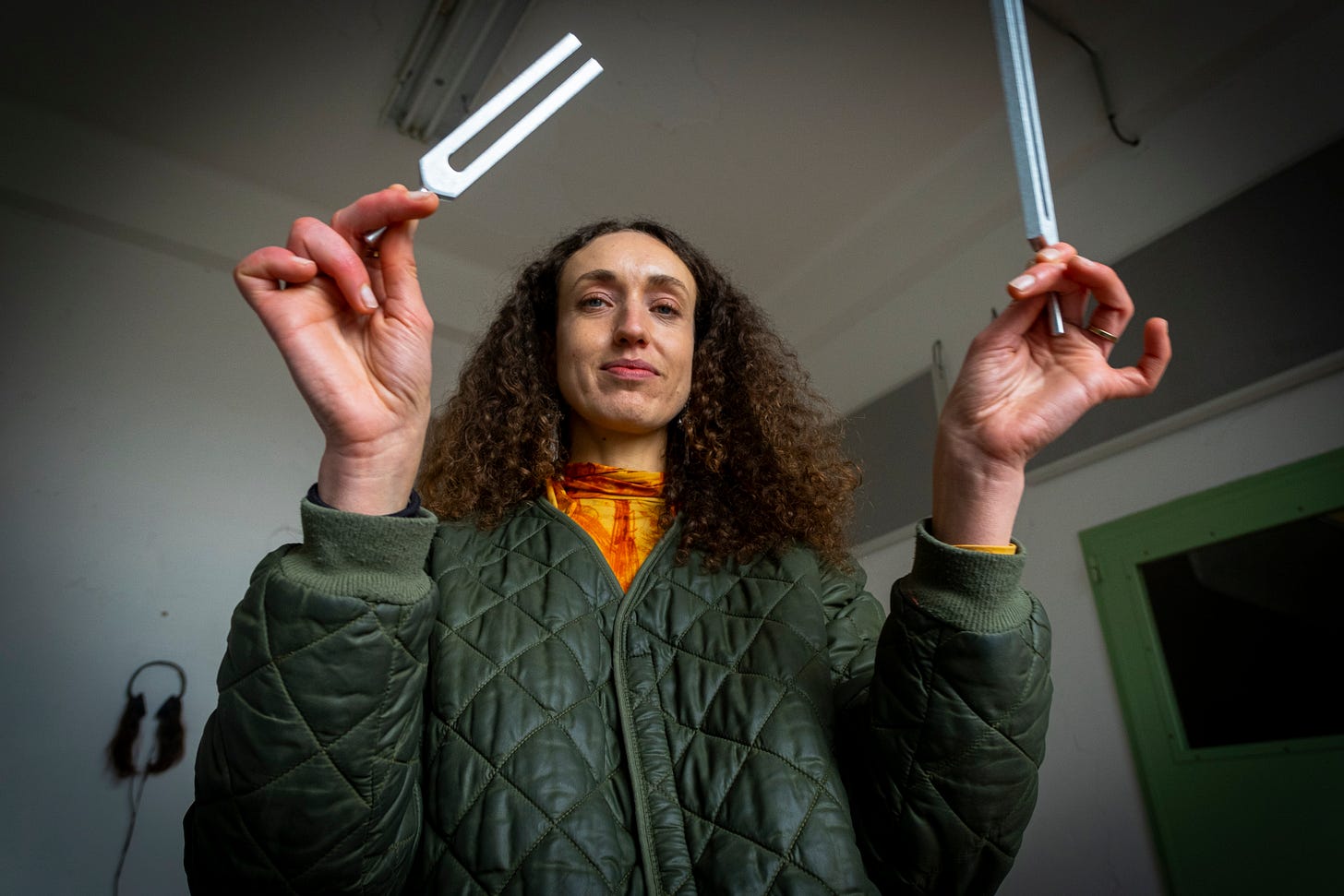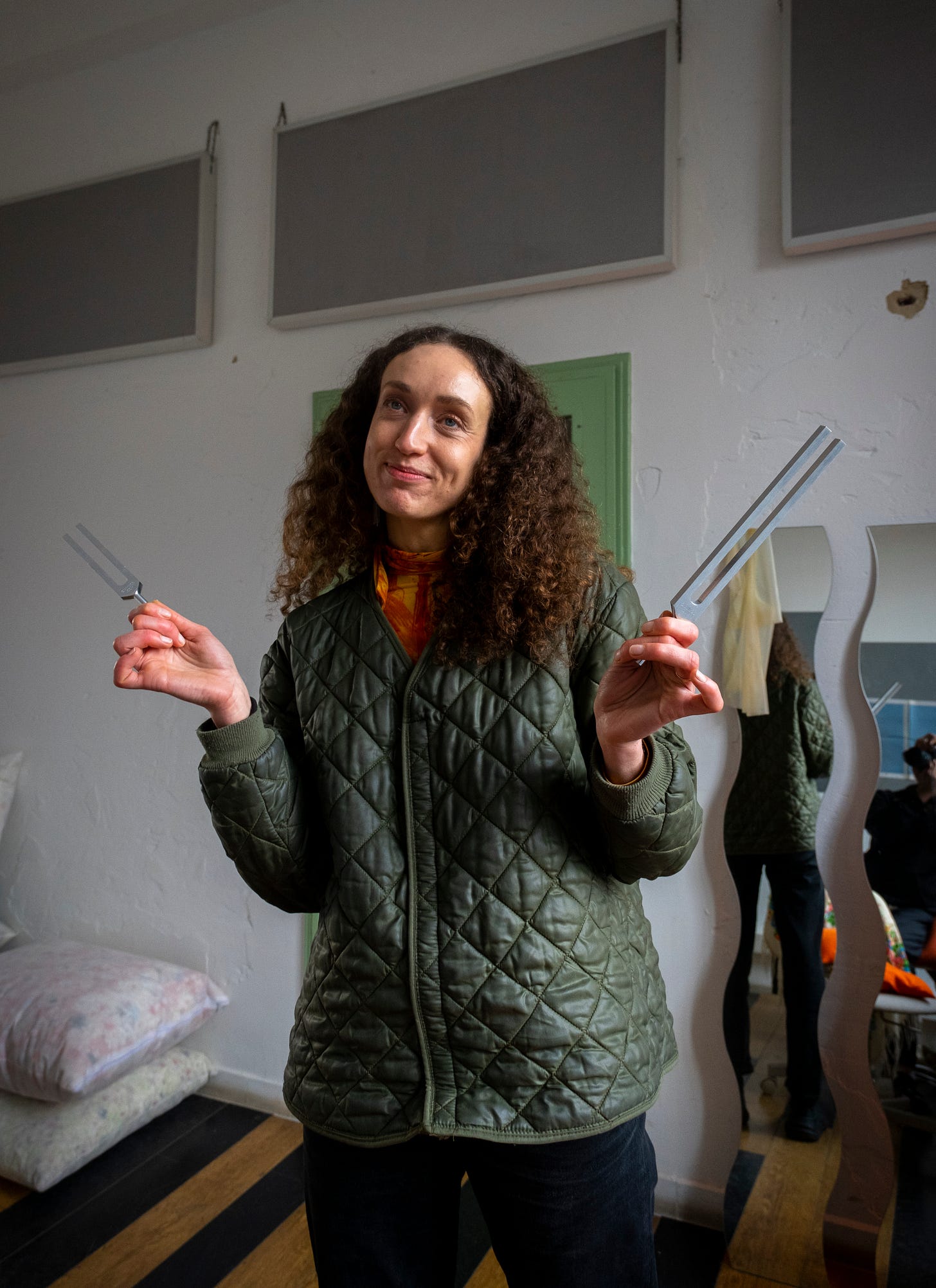Introduction: A Practice of Presence
A conversation with Artist, Hypnotist & Radio Producer Julia E. Dyck
JC: What is the longest hypnosis session you’ve ever given?
JED: The group sessions are typically an hour. That's about as long as I do them. I’m not sure if I’d do more than an hour but I have received hypnosis that’s been longer than an hour. But with sense of time -
JC: Out the window.
JED: Yeah, exactly.
JC: Yeah, (laughs) I don’t know what to say about that.
JED: Good.
JC: Is this the strangest request for hypnosis you’ve gotten?
JED: I haven't had many strange requests. There was someone who wanted to be able to finish a book? So that one was sort of abnormal. Most people are dealing with grief or addiction or lots of self-doubts or like, normal shit, you know? The problems people have are never what you would imagine.
JC: Could you give me an example?
JED: My friend, who is an activist and community organizer, has had moments where he didn’t feel like he was contributing anything or doubting his place in this world - that's the opposite of how you see someone. Another friend I have is truly chill and carefree and carefree, she feels like she takes on too much responsibility, and she wanted to be in touch with her inner child.
JC: You said You’ve been hypnotized.
JED: So many times.
JC: Can you describe one experience that created substantial change in your life?
JED: I did hypnosis for the first time because I wanted to quit smoking. I’d been smoking for a long time and I’d tried everything else, and I really wanted this to work, so I was very open to the experience. I wasn’t a good relaxer, I wasn’t good at meditating or turning off my brain. But I wanted it so badly that I was able to somehow will myself into giving myself over to this and It was extremely remarkable.
As I became more practiced, I realized I was able to sink into a trance state much easier. I was able to meditate, exercise or be a little more present in my life - being able to shut off my conscious mind when it is safe to do so or to know when that is.
JC: do you feel like hypnotism is a practice of presence?
JED: A bit? I think it is the pursuit of a trance state or noticing that you are in a trance state. It’s also a very specific presence - it's quite vulnerable. I like the phrase, “a practice of presence” because it is as simple as just being able to accept someone's attention and being able to turn your own gaze inward as a means of noticing what's going on in your own body, your own mind, your own life - it’s shockingly not easy to do that as a human being, you know?
JC: Definitely, I agree. We spend a lot of time doing just the opposite, expending a lot of energy, just running around like chickens with our heads cut off worrying about everything but the present. Oftentimes, when I talk to people about photography, especially about work in the street I always mention flow states or that for me, there are moments where you aren’t thinking about where the next photo is coming from, you’re just making them. That’s a state I’ve been chasing since I’ve been back in New York.
JED: That’s interesting. I think what you’re saying is very similar to what I’m saying except that in your scenario the gaze is on the other, or the situation. So you can enter into maybe a similar state but in your case, your gaze, what you see, is to the exterior.
JC: So you’ve never been called up by someone and they’re saying something like “I’ve tried everything. I’ve done this, that, and the third - can you just hypnotize me”? No desperate pleas?
JED: No, not yet! I don’t really have a clinical practice - I just do hypnosis here and there for my practice.
JC: You’re like the Winnepegian Jodorowsky but with hypnosis instead of tarot - and I guess you aren’t breaking plates on people’s stomachs.
JED: (laughs) Thank you for saying that. Also, when I was learning hypnosis I didn’t think I would ever want to do it outside of a context that was art. I didn’t see myself as a healer or something like that.
JC: Do you see yourself as that now?
JED: Yes. I don’t like the idea of seeing yourself as a healer but I think I’ve definitely had positive impacts on people’s lives and that feels fucking amazing. Once I started to recognize the impact this was having on people I felt like “Okay, how can I not? How can I just keep this for myself and my art?”
JC: It’s not something to be kept just for yourself.
JED: Exactly.
JC: I think that creates space for a wider discourse into art making and what art serves in the context of community and people and so on - Only recently, and by recently I mean in perhaps the last 40 - 50 years we have seen this, I’m not sure if it’s the right word but erasure, this pivot away from art being made to evoke some sort of feeling among gatherings of people, and in its place a return and greater emphasis on siloing, on keeping the work away from the purview of the public. Even within museums and other institutions, art is often behind a paywall. There is a blocking of the communal and thus, what some would consider healing.
JED: Totally. But I would also say that this applies to wellness. I think this is just neoliberalism you know? People are more, I don’t know, impressive in taking care of themselves, in self-care -
JC: Our generation is all about those things. We are essentially the wellness generation.
JED: Yeah, but it is still an extremely individualistic and neoliberal approach - like “you go to therapy, you take care of yourself” where actually the problems we are facing are structural problems that affect the community before the individual. You can’t actually deal with them on your own. I don’t know I’m still fucking figuring it out.
JC: Would you say that the Neo-Liberal outlook is why practices such as hypnosis or sound bathing or even crystal healing are frowned upon? I feel there’s no real ability to quantitatively and concretely define these things, to justify their financial value. This inability to measure in “objective terms” makes people call these practices “pseudoscience” today, but these practices have been used throughout history and for much longer than modern society’s existence.
JED: I think today we try to make people’s problems feel like they are just their own when really we should look at it as your problems are my problems and there is so little you can do on your own. Some would ask, “well what do you mean? Group therapy? How could you see things that way?” and it's because many of us are actually suffering from the same shit. Obviously, everyone has their own singular issues but a lot of things we think are just ours are not.
JC: Do you think there is a kind of collective hypnosis happening? Maybe this is more of a United States-specific question or you know, a question for any country that has major media organizations.
JED: But even instagram and tik tok right? That shit is fucking hypnotic and they know that. They also know it isn’t for good, it's for consumption. The more I learn about hypnosis and neuroscience and apply it to my critical knowledge of technology the more I - For example, I asked you to stare at this candle which makes a very narrow visual frame. Look at how narrow your phone is, it does the same thing to the mind. If you stare at something that is very small with very little motion your ocular frame becomes very tiny and you become unaware of the rest of the world. This is the state we are in all the time.
JC: The majority of our lives are in this hypnotized alienation space.
JED: Yeah but it's hypnosis for….I don’t know, being sold things, being sold the idea of productive.
JC: Ironically achieving what Marx and other thinkers spoke about in terms of capitalism anyway - alienation realized through the unabashed quest for self-actualization. This actually makes me think, do you think hypnosis is a holistic pathway to self-actualization or is this even the point?
JED: I don’t know. Sometimes I feel like I’m on the top of Maslow’s hierarchy of needs but on stilts. Like, Okay, my ego needs are met, I am self-actualized, traveling around the world, making art but -
JC: What more is there?
JED: Yeah, or do I feel like I have a community or do I actually feel safe and stable? I don’t ever really feel that so I feel like I’m missing the bottom part of the hierarchy. What I would say is that I am interested in fulfillment. Being able to visualize that in the mind is very important because things happen twice - first in the mind and then in life. So I think if you are able to visualize, like how I asked you to see yourself in your bathroom mirror at your most relaxed version of yourself, if you can even imagine that, then you're more likely to achieve it. Obviously, people want things, but if you can see it, if it fits your own imagination then the pursuit of fulfillment becomes a little easier and a little more concrete.
JC: And is vision necessary for fulfillment?
JED: I think it’s very helpful. If you can’t see it, if you can’t truly imagine it I think it’s very difficult to achieve.
JC: If it appears tangible you will get there.
JED: I was recently talking to someone about this idea of fulfillment and they mentioned that they have all the things they want but feel like a hamster on a wheel. They’re trying so hard to be fulfilled but it's not really on their list of desires for 2023, buying an apartment is.
JC: Yeah I can’t say it's on mine either, I just don’t want to be homeless come December (laughs).
JED: Exactly. I don’t know what fulfillment looks like but obviously, that's something we need to think about.
JC: There might be something to be said for that in art. I’m not so certain that we or our peers really see fulfillment in this. What you were saying about the hamster wheel is true I mean - you’re just gonna make work until you're dead. Where is the fulfillment?
JED: What will be enough? What institution or grant will make you whole?
JC: Right, when you have finally “succeeded”. And I can totally see how with this question, money has entered the conversation of art. You make all this fucking work, you get paid for it, you’ve been fulfilled. Fulfillment has happened. But as we know, money is ephemeral and many of us don’t have the financial consciousness to even deal with that. It’s just this hot potato that we have; you like money but can’t keep it etc. I say this to ask, what does fulfillment look like for an artist?
JED: My god what a bad time to ask me that. I don't even know what it looks like for me. I have been a professional full-time artist for a number of years now and now I’m starting to feel like I want my income to come from something else because the more it's tied to my practice the more it feels like a real job, and the more the work suffers. Things become less playful, less risk is taken and that sucks. I started making art because it was healing and felt good. And now it's a job, it's no longer fun if that's what's paying your rent.
I think for me, being paid a minimum, a living wage would be great. To have no stress about where money is coming from and to be able to make the kind of work you want to make I think would be so beautiful because while maybe you won't become famous, you will be able to sustain your practice and ultimately inspire other people. Without these worries, practices can really advance because people are experimenting and doing things together and inspiring one another whereas I don’t think making artwork that's going to impress or sell to an institution or fit into whatever discourse is going on at the moment is exactly advancing cultural production. So I guess that's it, not having to worry about economics would be nice.
JC: Being able to be present.
JED: Exactly, that would be my preference, but right now, I’m making websites.
Julia E. Dyck is an artist, hypnotist, and radio producer originally from Treaty One Territory/ Winnipeg who currently works and lives between Brussels and Montreal/Tiohtià:ke. Dyck's relational and speculative practice explores the possible connections between the body, (sub)consciousness & technology through performance, composition, installation and transmission. By offering services and acts of care, Dyck creates spaces, situations, and experiences of transformation. Julia often works collaboratively and is a member of the ffiles radio collective, Audio Placebo Plaza and artistic duos Future Perfect and Platitudes.





